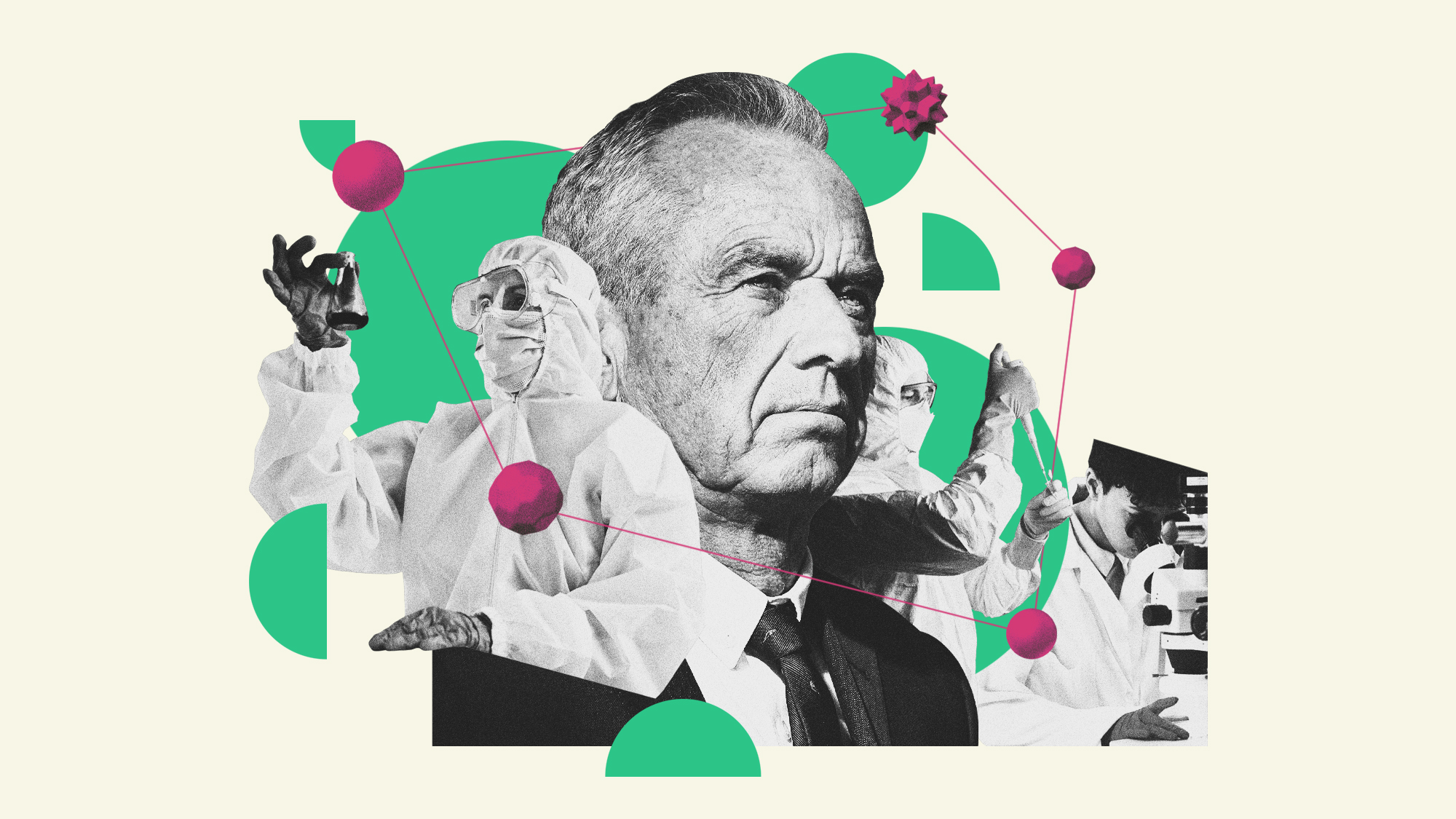What does RFK Jr's stop on mRNA vaccine development mean for rest of the world?
Effects of the funding cut could be 'measured in human lives'

A free daily email with the biggest news stories of the day – and the best features from TheWeek.com
You are now subscribed
Your newsletter sign-up was successful
The US health secretary's cancellation of nearly $500 million-worth of funding for multiple mRNA vaccine projects has been described as a dangerous decision for public health.
Robert F. Kennedy Jr, a long-standing vaccine sceptic, is pulling funding for work on vaccines and therapeutics that help protect us against respiratory viruses like Covid-19, influenza and H5N1 bird flu.
What exactly is RFK Jr scrapping?
On Tuesday, Kennedy said there would be a "co-ordinated wind down" of mRNA vaccine development programmes at the US government's biodefence agency, including the cancellation or modification of 22 separate projects. His reasons seem to centre on his long-held doubts about the safety and effectiveness of these vaccines.
The Week
Escape your echo chamber. Get the facts behind the news, plus analysis from multiple perspectives.

Sign up for The Week's Free Newsletters
From our morning news briefing to a weekly Good News Newsletter, get the best of The Week delivered directly to your inbox.
From our morning news briefing to a weekly Good News Newsletter, get the best of The Week delivered directly to your inbox.
First used at scale during the Covid-19 pandemic, mRNA vaccines deliver "instructions for making a harmless piece of protein" that's otherwise "identical to one found in a particular virus or bacterium", said UK Health Security Agency. "Our immune system recognises it as a foreign body and starts to produce antibodies which can attack the protein if it encounters it again in the form of the 'real' virus". This type of vaccine can be produced, modified and distributed much more quickly than a traditional vaccine – which introduces dead or weakened versions of the virus itself.
This speeding up of the production process is one of the key reasons mRNA vaccines have "long been distrusted by vaccine sceptics". Kennedy himself referred to mRNA vaccine technology as "troubled", and called older "whole-cell" vaccine technology "safer".
Kennedy also said that "mRNA vaccines don't perform well against viruses that infect the upper respiratory tract" – a "wildly incorrect statement", according to Brown University pandemic preparedness expert Jennifer Nuzzo, said The New York Times.
What does it mean for the US?
Kennedy's move has caused horror among experts in the field. "I don't think I've seen a more dangerous decision in public health in my 50 years in the business," Mike Osterholm, a University of Minnesota expert on infectious diseases and pandemic preparations, told Sky News.
A free daily email with the biggest news stories of the day – and the best features from TheWeek.com
Experts in vaccine research say this news is a "real blow" to efforts to prepare for the next pandemic, said Vox. The US will "now be further behind in developing new vaccines" – a consequence that's "likely to be measured in human lives".
What does this mean for rest of the world?
Consequences of the funding cuts could "deepen if other nations follow the US lead", said Newsweek, or if private investment in rapid vaccine development "wanes".
If "one of the largest markets in the world" decides not to invest in mRNA, manufacturers "will be less willing to invest their own resources in the technology", Andrew Pollard, director of the Oxford Vaccine Group that led the development of the Oxford-AstraZeneca Covid-19 vaccine, told The Guardian. The "wider implications of this decision could be that the world is less safe".
Despite his recent protestations to the contrary, Kennedy's move (and past statements) reinforce the impression that he has a more general anti-vaccine stance – and this, too, could also have profound consequences, especially when vaccination rates are already falling globally. "Misguided beliefs" like Kennedy's are "likely to cause unnecessary suffering and death, particularly in children", said David Elliman, an honorary associate professor at UCL and a clinical adviser to the UK National Screening Committee.
Kennedy's cuts will unquestionably harm the US but they also present an opportunity for scientists elsewhere in the global community to take the lead, Kate Bingham, who led the UK's vaccine taskforce during the early part of the Covid pandemic, told The Guardian. The UK already has collaborations with two firms working on mRNA technologies, BioNTech and Moderna, and has invested in a new £26.4 million RNA Centre of Excellence to develop new mRNA therapies and vaccines.
Chas Newkey-Burden has been part of The Week Digital team for more than a decade and a journalist for 25 years, starting out on the irreverent football weekly 90 Minutes, before moving to lifestyle magazines Loaded and Attitude. He was a columnist for The Big Issue and landed a world exclusive with David Beckham that became the weekly magazine’s bestselling issue. He now writes regularly for The Guardian, The Telegraph, The Independent, Metro, FourFourTwo and the i new site. He is also the author of a number of non-fiction books.
-
 Labor secretary’s husband barred amid assault probe
Labor secretary’s husband barred amid assault probeSpeed Read Shawn DeRemer, the husband of Labor Secretary Lori Chavez-DeRemer, has been accused of sexual assault
-
 Trump touts pledges at 1st Board of Peace meeting
Trump touts pledges at 1st Board of Peace meetingSpeed Read At the inaugural meeting, the president announced nine countries have agreed to pledge a combined $7 billion for a Gaza relief package
-
 Britain’s ex-Prince Andrew arrested over Epstein ties
Britain’s ex-Prince Andrew arrested over Epstein tiesSpeed Read The younger brother of King Charles III has not yet been charged
-
 Trump HHS slashes advised child vaccinations
Trump HHS slashes advised child vaccinationsSpeed Read In a widely condemned move, the CDC will now recommend that children get vaccinated against 11 communicable diseases, not 17
-
 A fentanyl vaccine may be on the horizon
A fentanyl vaccine may be on the horizonUnder the radar Taking a serious jab at the opioid epidemic
-
 Health: Will Kennedy dismantle U.S. immunization policy?
Health: Will Kennedy dismantle U.S. immunization policy?Feature ‘America’s vaccine playbook is being rewritten by people who don’t believe in them’
-
 How dangerous is the ‘K’ strain super-flu?
How dangerous is the ‘K’ strain super-flu?The Explainer Surge in cases of new variant H3N2 flu in UK and around the world
-
 Vaccine critic quietly named CDC’s No. 2 official
Vaccine critic quietly named CDC’s No. 2 officialSpeed Read Dr. Ralph Abraham joins another prominent vaccine critic, HHS Secretary Robert F. Kennedy Jr.
-
 This flu season could be worse than usual
This flu season could be worse than usualIn the spotlight A new subvariant is infecting several countries
-
 Covid-19 mRNA vaccines could help fight cancer
Covid-19 mRNA vaccines could help fight cancerUnder the radar They boost the immune system
-
 Is this the end of ultraprocessed foods?
Is this the end of ultraprocessed foods?Today's Big Question California law and the MAHA movement are on the same track